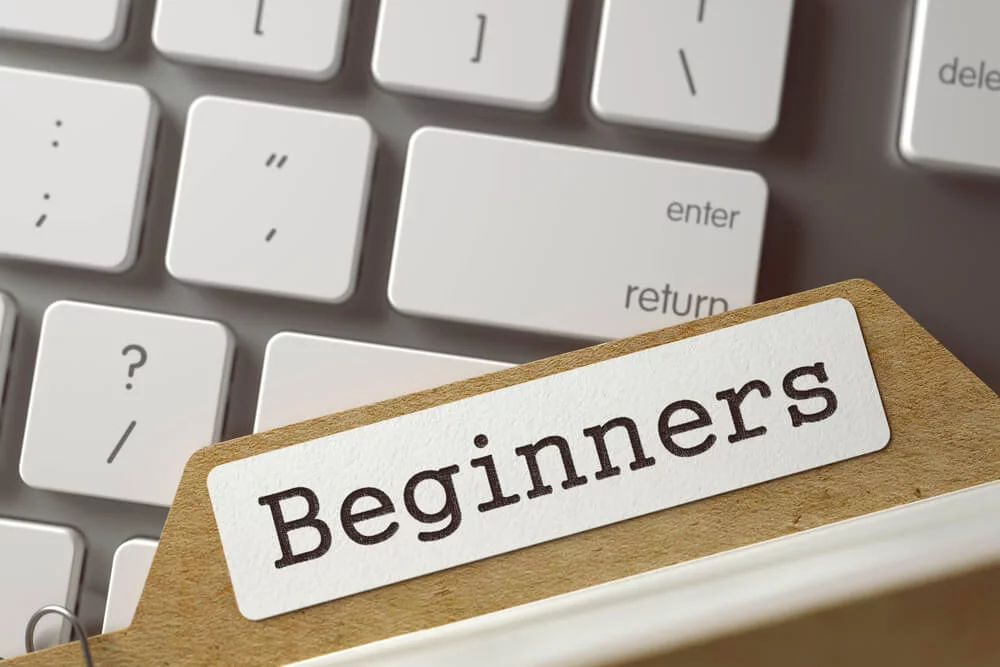
Webinars are everywhere now, and it feels like everyone already knows how to run them. If you are just getting started with online events, the idea can seem a little intimidating, especially when you have beginner questions that you might feel shy about asking.
Beginner’s Guide to Hosting Your First Webinar
Summarize with
Table of contents
Don’t worry, our beginners’ guide to hosting webinars has got you covered. This article will walk you through everything you need to know about getting started in the world of online events.
Beginners guide about hosting webinars
Don’t worry! You don’t have to be a tech genius to host webinars! Even if you’re still figuring out Zoom, you’ll find it surprisingly easy to get your webinars going.
If 2020 was the year the entire world started working and socializing online, 2021 has been the year that online events and webinars started to feel like the norm. And even as ‘real world’ events start to open up again, statistics show that webinars are here to stay. The good news for non-techie types is that increased demand for user-friendly software means that webinar-hosting tools are easier to get to grips with (and easier on the wallet) than ever before.
Perhaps you’ve been asked to run a webinar for work purposes, and are floundering over where to begin, or perhaps you’ve already got a strong social media presence and solid follower/subscriber figures, but feel like you’ve missed the memo when it comes to webinars. Whatever your current situation, here’s your beginner’s guide to webinars.
So, what is a webinar?
Even if you’ve never attended a webinar, chances are that you’ve grasped the notion that the term relates to some type of web conference. In fact, as the name suggests, a webinar is an online seminar, which allows one or more speakers to address online attendees anywhere around the world. The events can be transmitted in real-time, but many are designed to be evergreen events that can be viewed online long after the live transmission.
If an online seminar sounds like a dry, academic affair, rest assured that this is rarely the case. While many universities and colleges have indeed taken their classes online during the pandemic, webinars are used by everybody from big businesses to sports stars and celebrities looking to boost their brand. To whet your appetite for getting started with webinar hosting, take a look at this round-up of some of the best webinars of 2021 so far (all free to stream). Once you’ve experienced what a webinar can do, it’s a good moment to start thinking about your purpose for using it. Do you need it for your job? Do you want to earn money from it? Or are you looking to strengthen your personal brand? In the end, your main reason for hosting a webinar will determine which tools will work best for you.
What type of webinar do I want to host?
Hosting webinars for beginners can be a simple process once you have a clear idea of the type of event you want to host, and the audience you wish to reach.
Setting your priorities
Before you commit to anything, ask yourself what is the ultimate goal of your online event?
That will determine the type of your webinar. Here are some common options:
1) Marketing webinar
Marketers love webinars, not least because they are a cost-effective way to engage with an audience. Stats show that marketing webinars tend to be most popular when there is an element of interaction, e.g. a Q&A session. Marketing webinars have soared in popularity in the last few years and can be a good way for marketers to stamp their personality on a campaign since they bring an incredible return on investment.
2) Sales webinar
If marketing webinars are about raising awareness and improving brand recognition, sales webinars are all about closing the deal. Whether you’re selling properties or soft drinks, or even your own handmade accessories or your services as an online life coach. If you’ve got a good offer for your audience, a sales webinar can help you showcase it in the best light. Of course, if you want to make good sales numbers, you’ll need a good number of attendees: this post has useful tips for attracting people to your webinar.
3) Meeting webinar
Such webinars are common in a business environment, where good communication and networking are crucial. With fewer attendees than webinars in the public sphere, these can often be hosted on user-friendly platforms such as MyOwnConference.
4) Training webinar
Remote working has made online training a necessity for many companies, and training webinars can also be a good opportunity for employee-employer interaction that may be lacking in the remote working environment.
Finding partners and presenters
Once you’ve nailed your niche, you might want to consider teaming up with like-minded individuals to boost the reach of your webinar. If your aim is to host a small-scale workplace webinar, you might want to speak with others in the company who can share hosting duties. If you are hosting a marketing or sales webinar, chances are that you will want to bring in a known online name that can swell the numbers of attendees and lend credibility to your brand.
Here are just some things you can try
- Invite them as co-presenter. This strategy is a win-win for both of you since you get to preach to each other’s audiences.
- Engage in affiliate marketing. Ask your partner to advertise your product/service to their viewers for commission.
- Write guest posts. Create an exciting blog post to be published on their website with a link to your site.
If you’re not a big name and don’t have many followers online, you may get many denials at first. Don’t get discouraged and make sure your offer is transparent and genuinely beneficial for you and your potential partner.
Which webinar software should I use?
This is where people starting out in webinars can start to flounder: figuring out what webinar software you need and how much it will cost can seem a daunting task. But it needn’t be. MyOwnConference webinars are user-friendly for hosts and attendees alike.
The software you need really depends on the type of webinar you want to host. Webinar technology is advancing all the time — look at what makes other webinars in your field successful and then look for tech that will allow you to incorporate these techniques into your own webinar. Slides, for example, are a major focus in many business and sales, webinars, so look for user-friendly software that allows you to incorporate these. If you are running marketing webinars with multiple hosts and a strong visual element, you may want to look into higher quality cameras and microphones.
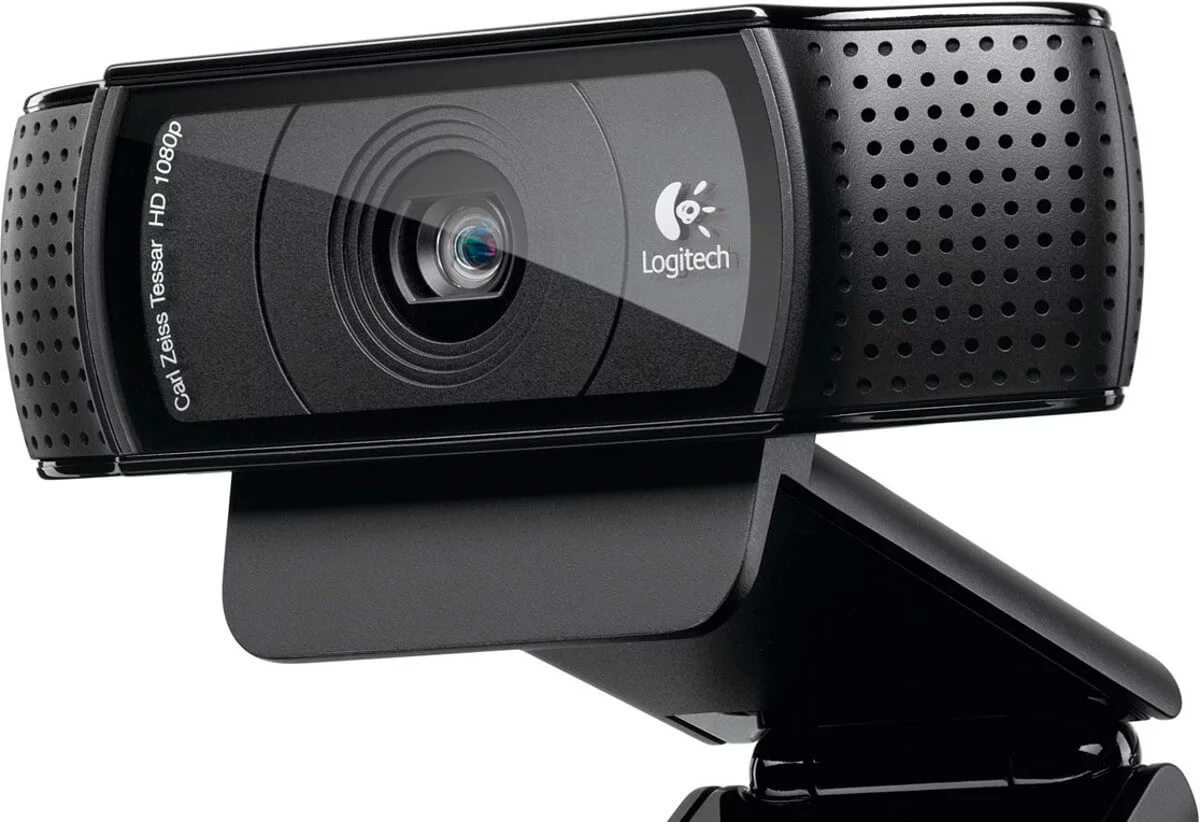
Here is a more detailed article about webinar software as well as tips on how to choose a camera and microphone for a webinar.
Beginner’s guide to scheduling a webinar
Stats show that most people sign up for a webinar around eight days in advance, but you’ll want to spread the news about your online event well before. Expert webinar hosts say that Thursdays are the best time to host a webinar regarding attendance figures. Make sure to plan according to your target audience’s time zones. For example, if you are in London and want to reach people in the United States, you may need to host your event later in the evening because the UK is about five to eight hours ahead of most U.S. cities. It is also a good idea to schedule your webinar about a month before the event. Once you have set the exact date and time of your event, you will be less likely to procrastinate or give up on the idea altogether.
Promoting a webinar if you are beginner
If you want to market your event or earn money from attendance fees, you need to promote it because promotion is the key to your webinar’s success. Start spreading the word loudly and everywhere at least two weeks before the event. It is not the time to hide your light. Contact any influential friends and followers and ask them to help spread the word, and make sure you plug it on all your available social media. Send the sign-up links to everybody on your marketing mailing list. But try not to flood people with messages because too much promotion can easily turn them away. There is such a thing as doing too much. Make sure to use every possible tool to promote your webinar, including your website, blog, social media, and word of mouth. Add Instagram posts, YouTube videos, and Facebook Shorts, and remember that you should not limit yourself to just one type of content. Your promotional strategy should include versatile elements if you want to attract a diverse audience.
For example, Pixlee published webinar anons on Facebook and then sent a newsletter. (And if you need help crafting the perfect email invite, check out this link)
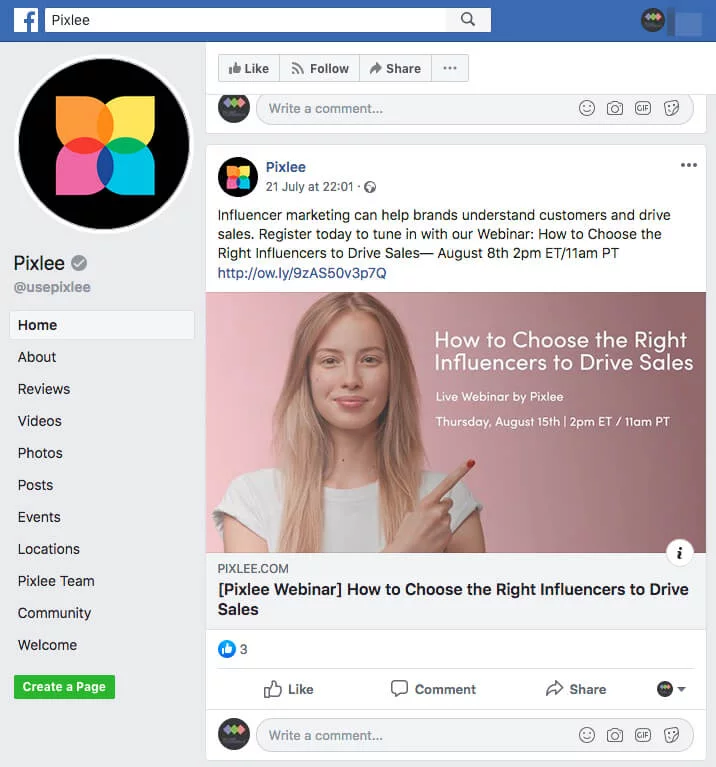
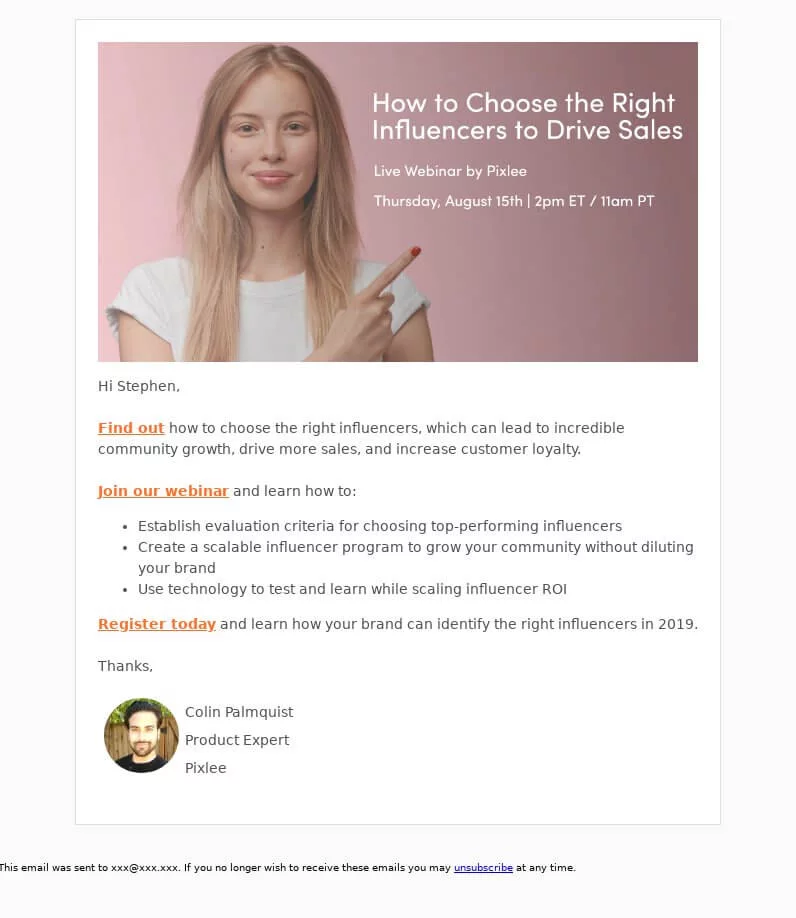
Writing a webinar script
No matter how good you are at quick-witted responses and improvised chat, a webinar script is a must for any successful online event. Don’t be tempted to skip it! And if you have co-hosts, make sure you’re on the same page when it comes to who is saying what, and when they will be saying it. You don’t want five people making the same point or talking over each other. Adjust the tone to your target audience: Do you want to be witty and irreverent for a young, sassy market? Or serious and to-the-point for a business presentation? Bring your USP (unique selling point) to the fore. If you’re naturally shy, own up to this, and you’re likely to get your audience on your side. If it’s your first webinar smoothly, again, let your audience in on the fact that it helps to be seen as human rather than just a cog in the corporate wheel!
Try to let your personality shine, without taking the spotlight away from your main point of focus. And if it helps with your webinar for beginners, have practice run-throughs with friends and family. Ask for feedback and incorporate this before the live event.
Script before you speak
By this point, you must already have an outline with the title and major points. Now you just need to sit down and elaborate on everything in more detail.
Never disregard this step. It is not enough to have a bullet list. You must write everything down just as if it was a college paper.
The primary reason for this thorough preparation is the time limitations. You may think you can explain the point in 5 minutes, but once you pin it all down, it can turn out to be 10 minutes.
In this case, you will need to cut corners, shorten the sentences, maybe exclude some of the minor ideas. Perhaps, with a little bit of repetition, you will learn to speak faster; however, you must remain intelligible.
What is more, you need to coordinate your speech with the slides. Make sure to have only one point per slide if you care about your viewers’ comprehension.
If you have co-presenters, ask them to review your script and provide criticism. Do the same for them: you are a team, after all.
During the webinar
Log in at least an hour in advance to make sure everything works just fine.
During a webinar, try to look directly into the camera for a more personal connection.
If you have an open event and a live chat function, be sure that you know how to moderate the chat (or delegate this task to somebody else) and to block any negative comments.
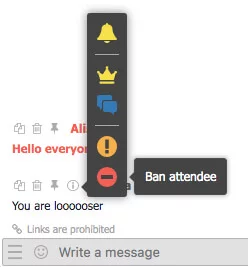
In case you’re unsure you can handle many things simultaneously, having a moderator on-site is a good idea. When delegating, take some time to speak to the moderator about how the tech works and ensure they have a clear idea about what would constitute an inappropriate and ban-worthy comment. Try to relax and improvise a little. Even if you know the script by heart, you won’t sound natural simply retelling it unless you are a good actor. Do not be afraid to go off track and make a joke sometimes. However, remember to stay balanced and keep things in moderation.
For a helpful guide to security during your webinar, this MyOwnConference blog post is a good read.
Many beginners to sales webinars feel uncomfortable pitching a sale or making any other financial proposition. But the event is about self-promotion: our tip for you is to take a deep breath and just do it.
It may be awkward at your first webinar, but it will come more naturally over time.
In the end, thank your webinar audience for their time: address the camera directly and make sure that you express how glad you are that they took the time to join your online event!
After the webinar for beginners
Following up on your webinar is key to sustained success.
Send thank you emails to everyone on your mailing list and include a little extra for those who joined, such as a special discount on upcoming events.
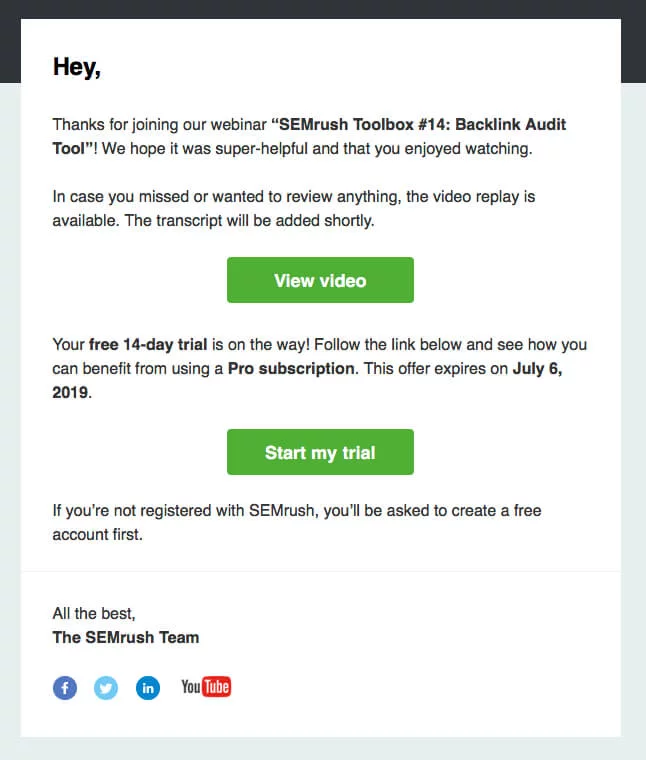
Make sure your attendees know all about future events and send links to follow up materials or anything else that might pique their interest. If you want some tips on what worked and what didn’t, try asking for feedback on your webinar.
Conclusion: How to be a winner in the world of webinars?
Congrats – you’re on your way to hosting your first webinar! We’ve shared a bunch of resources and inspiration, so now it’s time to get that plan rolling. Here’s a quick recap of your next steps:
- Determine the type of webinar you want to host Approach suitable partners and co-presenters, if appropriate to your event
- Think of the title and main points. Create a short outline
- Choose the right software and hardware
- Promote extensively
- Write a script and practice the delivery
- Run a webinar
- Follow-up with a thank-you email and more offers
And remember, all those highly successful webinar hosts had to start out somewhere, just like you will when you join our webinar for beginners.
FAQ
A webinar is an online seminar that allows one or more speakers to address attendees anywhere in the world and can be live or recorded for later viewing. It is useful because it lets you engage an audience cost-effectively, build your brand, generate leads or provide training without the constraints of physical location.
You decide what kind of webinar to host by thinking about the main purpose of your event. It could be focused on marketing, sales, training, or internal meetings, and that purpose will guide your choice of format, audience, and the tools you plan to use.
When selecting a webinar platform and equipment you should look at whether the software supports your required features (like slides, multiple hosts, good audio/video) and whether your camera/microphone deliver the quality your format demands; the software you need depends on the type of webinar you are running.
Start by choosing the right date and time while considering time zones and giving yourself enough time to prepare. Next, promote it openly on your website, social media, and mailing list, but try not to send too many messages since your goal is to reach people in different ways rather than overwhelm them.
During the webinar you should log in early, check your tech, look into the camera to connect with your audience, and if using chat ensure moderation to handle any issues. After the webinar you should follow up with thank-you emails, additional offers or links and ask for feedback to learn what worked and what didn’t.
An expert behind the simplified online meeting and webinar software platform, MyOwnConference. In today’s flexible work environment, Dan offers invaluable life hacks, in-depth reviews, and savvy tips for organizing, promoting, and excelling in virtual conferences and webinars.











